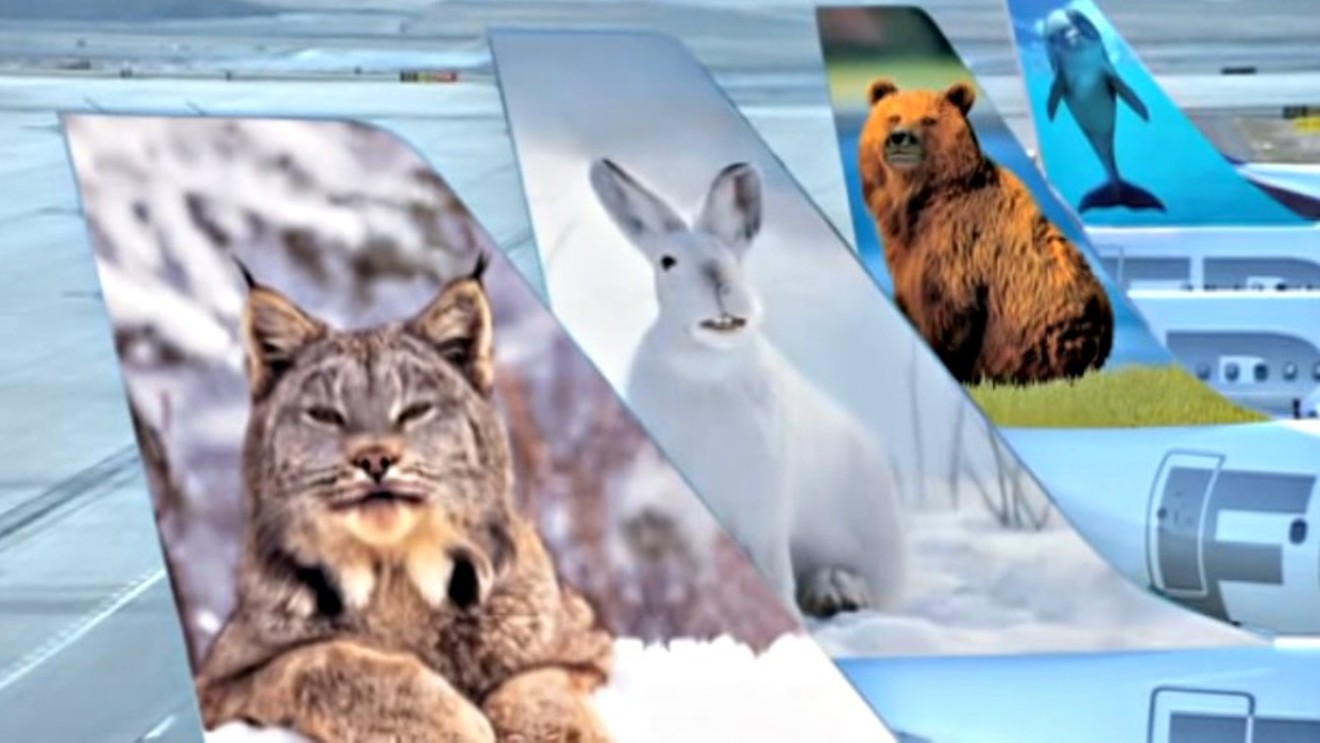This is hardly the first time Frontier has landed at or near the lower end of quality rankings in recent years, as documented in 2014, 2017 and last year — which may explain why the airline didn't reply to Westword's request for comment about the latest one.
Metro State University of Denver's Jeffrey Price, a professor in the Department of Aviation and Aerospace Science, places much of the blame for the poor performance on Frontier's embrace of what's known in the industry as the ultra-low-cost model, which offers a low upfront fee but assesses charges for a wide variety of amenities, including drinks, snacks and baggage.
"I used to fly Frontier all the time," Price notes. "But once they switched to ultra-low cost, I found out that sometimes I was paying more for airfare, and it was more inconvenient. So it really doesn't surprise me that the ultra-low-cost carriers wind up near the bottom."
Indeed, Frontier isn't the only carrier using this approach to fall short in The Points Guy's third annual airline-quality study. It's joined in the second half of the roster by jetBlue, Allegiant and Spirit. However, Frontier has fallen farther than any of its peers. The carrier seized the number-five slot in The Points Guy's 2018 look at the best and worst airlines.
Here are the 2019 standings, with comparisons to last year's results.
Number 1: Delta (up two)According to Scott Mayerowitz, executive editorial director for The Points Guy, who corresponds via email, the site's analysts don't prize a single factor over all others when it comes to assessing airline quality, "but some factors carry more weight than others. For example, it’s more important for an airline to make its flights on time than to have universal seat-back entertainment screens."
Number 2: Alaska (down one)
Number 3: Southwest (down one)
Number 4: United
Number 5: Hawaiian (up four)
Number 6: American
Number 7: Jetblue (up one)
Number 8: Allegiant
Number 9: Spirit (down two)
Number 10: Frontier (down five)
This year, however, he notes that "we placed even more emphasis on timeliness...and Frontier’s on-time rate was abysmal. About one in four flights was late."
The metrics for 2019 were weighted as follows: 15 percent apiece for timeliness (arrivals and departures that were delayed) and cabin features (Wi-Fi availability, free Wi-Fi and messaging, seat pitch and width, etc.); 10 percent each for cancellations, route network (the number of cities served), ticket value (how much airlines made from customers compared to how many miles they flew them), fees (particularly for extra bags and flight changes), frequent flyer program and customer satisfaction; 5 percent for lost baggage reports; 3 percent for the airline's lounges; and 2 percent for passengers bumped from flights.
When it comes to ticket price alone, Frontier excelled. "Frontier passengers pay less to get where they’re going than anyone else," Mayerowitz acknowledges. "But the savings come at the cost of creature comforts and time spent just waiting around."
The single most important area in which Frontier must improve? "They have to work on meeting their own schedules," Mayerowitz replies. But he concedes that other elements come into play, including the labor situation that has bedeviled Frontier of late. In January, its pilots finally authorized a new contract after a decade of beef marked by numerous strike threats. Meanwhile, Frontier's flight attendants have authorized a walkout even though they are restricted from immediately hitting the picket line under the federal Railway Labor Act. Tomorrow, March 20, at 12:45 p.m., hundreds of flight attendants are expected to stage a rally at Civic Center Park to highlight their situation.
Quantifying how these scenarios impacted Frontier from a quality standpoint is tough, Mayerowitz allows. "Unhappy cabin crews may have boosted the number of complaints passengers filed against Frontier with the Department of Transportation, but cabin service wasn’t one of the categories we ranked airlines on. That said, Frontier did pretty poorly in customer satisfaction last year, too, so it seems pretty consistent."
MSU Denver's Price sees potential linkage, too.
"A lot of folks who went to work for the new Frontier," following its emergence from bankruptcy in 2009, "thought they were going back to work for a resurrected legacy carrier that's had a long history in Denver. It had risen from the ashes and rebranded, and they thought that's what it would be. But with the change in ownership structure and the change to ultra-low cost, a lot of them felt like, 'This isn't what we signed up for.'"
Such workers tend to keep these feelings hidden, Price believes. "What I see is people being professional on their face and doing what they need to do for the job. But behind the scenes, they're going, 'I can't believe what they're doing to us.' They don't want to leave; they've got a lot invested, and I think some of them are still hoping that the model will change back. I listen to the pilots and the flight attendants and the mechanics and the gate agents more than anyone else. They're the boots on the ground, so to speak. And they'll tell you the real story. You can't just talk to one or two of them. You have to talk to several, and when you do, you'll start to sense a theme — and the theme is that since they changed the model, not a lot of them are really happy to be working for Frontier, but they're going to keep doing it, because it's the job."
As for the ultra-low-cost paradigm, "the airlines keep telling everybody passengers love it because they don't have to pay for anything they don't need," Price goes on. "But being a frequent flyer myself, I don't want to be nickeled and dimed for everything, and I don't want to have to sit there and do algebra to figure out what my airfare is. I want to know what the cost is, so I can pay that cost."
He describes the difficulty of doing this on Frontier by sharing a personal experience: "The last time I flew Frontier was a few years ago. I had an emergency and I had to fly back home, and it was the first flight I could get. The customer service people were extraordinary, the people at the gate exceptional, the flight attendants and other personnel great, the pilots tremendous — I went to school with a lot of them, and they're good friends of mine. But they tacked on all these additional fees. It was like taking a ride on a city bus and being told, 'You've got an extra bag? That'll be another $25.'"
Such tactics have an impact beyond the wallet, Price feels. "The reason people fly one airline over another isn't necessarily the cost. It's the emotional factors, like 'How safe do I feel?' Irrespective of the fact that Frontier is every bit as safe as United and the other airlines out there, it's the feeling that matters. And I think people are willing to pay more to feel better emotionally and not just financially."
That said, Price sees the gap between the ticket prices for typical carriers and their ultra-low-cost brethren narrowing, giving the latter less of an advantage from a pure dollars-and-cents standpoint — particularly for people who want to be productive while they're aloft.
"A business traveler looks at the ultra-low-cost model from a completely different perspective than the leisure traveler does," he maintains. "Ultra-low cost is really for the leisure traveler who doesn't fly that often, and when they do, they don't want to spend a lot of money doing it, and they're willing to trade inconvenience for cost. But business travelers, who really fund the majority of the airlines, want to be able to work on the plane. They don't want the seat in front of them to fall in their lap and bust their tablet or laptop in two. They want a decent seat, and they don't want to have to pay for every little thing and then figure out how to put that in their expense reports."
With that in mind, Price thinks Frontier will struggle to get out of the quality cellar until it changes its blueprint. "Ultra-low cost is just not the way to run an airline," he says. "As long as they're making enough money to keep the planes in the air and keep them in safe operations, there's always going to be these models out there. But I wouldn't expect them to be topping charts anytime soon."
This post has been updated to include information about a March 20 rally scheduled at Civic Center Park involving Frontier flight attendants.













